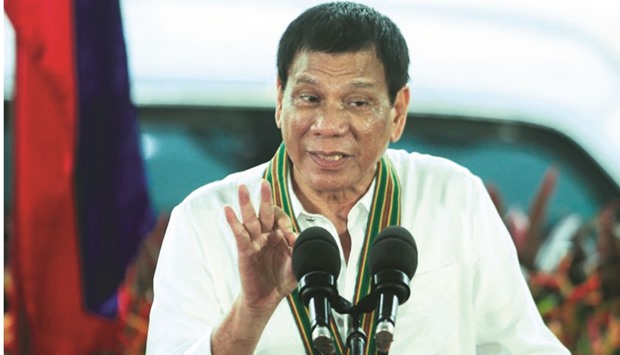Investors in Philippine shares are giving Rodrigo Duterte the worst reception for a new president in almost two decades after a tumultuous first 100 days.
The Philippine Stock Exchange Index has dropped 2.8% since the day before Duterte’s June 30 inauguration, the only decliner among major Asian gauges and trailing an 11% advance in the MSCI Emerging Markets Index. It’s the poorest showing for a new leader since stocks slumped 31% in 1998 in the first 14 weeks of the presidency of Joseph Estrada, the film actor-turned-politician who was impeached for corruption three years into his term.
Equities in Manila initially soared on Duterte’s election victory, with the benchmark gauge reaching a 15-month high in July, amid optimism he could accelerate one of the fastest economic growth rates in Asia. But the euphoria melted away as concern over high valuations was exacerbated by Duterte’s volatile response to critics of his deadly anti-drug campaign. Foreigners pulled $531mn from the market in a 22-day run of outflows.
“Duterte is unpredictable and anything that’s unpredictable is negative,” said Hans Goetti, the Dubai-based chief strategist for the Middle East and Asia at Banque Internationale à Luxembourg, which manages $40bn. “The worst thing for the markets is they don’t know what they’re dealing with.”
The country’s stock index is still higher than where it was when Duterte was elected. It rallied 16% from the May 9 vote to this year’s high on July 21 before falling 6.5%. While foreigners pulled $316mn from Philippine shares since the end of July, they’ve bought a net $743mn in 2016. The gauge closed down 0.6% yesterday.
Duterte’s spokesmen, Ernesto Abella and Martin Andanar, didn’t respond to mobile-phone messages seeking comment from the president.
The Philippines’ economic growth, which has accelerated over the last five quarters and reached 7% in the three months through June, may have prevented a more marked decline in the share market. Duterte is pledging to cut personal income tax next year and wants to spend twice the amount spent on infrastructure in his six-year term than Aquino did in his. Investor concern over Duterte is “overdone,” Mark Mobius, executive chairman of the Templeton Emerging Markets Group, said last week.
“The market is just pricing in the risk and ignoring the fact that the government has a sound economic plan and a promising fiscal programme on the table,” said Julian Tarrobago, a director at Maybank ATR Kim Eng Capital Partners Inc, which manages four of the 10 best performing Philippine funds. Tarrobago said he liked infrastructure stocks that will benefit from the government’s programme such as Megawide Construction Corp and EEI Corp.
Duterte hasn’t responded well to criticism of his anti-drug campaign, which has so far resulted in the deaths of more than 3,000 people. His threat to curse Barack Obama resulted in the US president cancelling a one-on-one meeting with the Philippine leader at a summit in Laos. Duterte accused the US, its second-largest trading partner and the fourth-biggest investor in the country last year, of “undermining” the Philippines and said he’ll visit China and Russia to pursue “new alliances” in trade.
“The president’s comments and deteriorating relationship with the US is going to have economic consequences for the Philippines,” said Shane Oliver, the Sydney-based head of investment strategy at AMP Capital Investors Ltd, which manages more than $110bn. “Investors are worried that there’s going to be economic fallout.”
The former mayor of Davao City has aggressively gone after online gambling companies, with shares in PhilWeb Corp plunging 67% since the end of June as Duterte said its owner, Roberto Ongpin, had an undue influence on the government.
Environment Secretary Gina Lopez has targeted miners, ordering them to comply with environmental rules or shut down. Chamber of Mines President Philip Romualdez has said that $25bn of investments in the country, the world’s biggest supplier of nickel ore, are on hold and three quarters of a million people could lose their jobs. Marcventures Holdings Inc tumbled 17% on Sept. 27 after the nickel miner was recommended for suspension.
S&P Global Ratings warned last month of “rising uncertainties surrounding the stability, predictability, and accountability” of Duterte’s government as it affirmed the country’s BBB rating, the second-lowest investment grade. The American Chamber of Commerce said Sept. 8 that the drug killings are harming the country’s image and some investors are concerned the rule of law is being eroded.
The performance of the stock market from the June 29 close compares with a 26% increase when Benigno Aquino took power in June 2010 and a 16% advance in 2004 when Gloria Macapagal Arroyo won her own six-year term. The peso weakened 2.6% since the end of June, the worst performance in Asia after Malaysia’s ringgit.
Philippine shares have long been some of the most expensive in Asia and their decline from late July came as the gauge’s 12-month price-to-earnings ratio rose to 19.6. It’s since dropped to 18, still higher than 15.6 in Indonesia and 14.5 in Thailand.
“From a fundamental perspective, Philippine stocks have been very pricey,” said Robert Ramos, chief investment officer at Union Bank of the Philippines in Manila. “And while many believe that the long-term story is still there, investors have taken a wait and see stance as they try to assess the direction Duterte’s government will take.” -With assistance from Clarissa Batino.

Philippines President Rodrigo Duterte gestures as he delivers a speech at a press conference in Manila. Investors in Philippine shares are giving Duterte the worst reception for a new president in almost twodecades after a tumultuous first 100 days.
